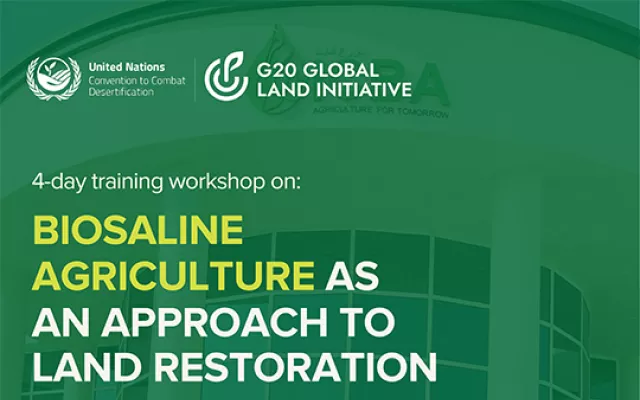Developing value chains for halophyte-based food products in UAE
The International Center for Biosaline Agriculture (ICBA) is working with several government and private entities in the UAE to develop value chains for food products from halophytic plants.
Under a project funded through the Expo 2020 Dubai's Expo Live Innovation Impact Grant Program, ICBA is helping farmers in the emirate of Abu Dhabi grow Salicornia, a halophytic or salt-loving plant, and fish using reject brine from desalination units.
The results of this project were recently discussed during a virtual meeting organized by ICBA.
The meeting brought together local farmers, scientists, consultants, and experts from different organizations such as the Abu Dhabi Agriculture and Food Safety Authority (ADAFSA), the Khalifa Fund for Enterprise Development (KFED), the Environment Agency – Abu Dhabi (EAD), and the Global Food Industries LLC/Healthy Farm Eatery. During the meeting, participants highlighted the importance of halophytic crops and the role of public-private partnerships in developing the value chains for such crops and boosting halophyte-based food production in desert environments like the UAE.
Halophytes have shown great potential for unconventional agriculture in the desert and harsh environments such as the Middle East and North Africa (MENA) region. For example, Salicornia can be cultivated on poor soil and irrigated with saline water or even seawater. These crops are fit for human and animal consumption, and have industrial uses as well.
While addressing the meeting, Dr. Ismahane Elouafi, Director General of ICBA, said: "Though Covid-19 has made the implementation of some project activities challenging, I am happy to see the targets of Phase 1 of the project achieved. Farmers are successfully growing Salicornia and fish, and Salicornia-based products are already being developed. All of this has been possible thanks to the strong collaboration between ICBA, the Abu Dhabi Agriculture and Food Safety Authority, the Khalifa Fund for Enterprise Development, the Environment Agency – Abu Dhabi, Healthy Farm Eatery, and most importantly, eight farmers from the Abu Dhabi emirate."
"To further develop and scale up the value chains for Salicornia – which is irrigated with reject brine from inland desalination units, which in some cases reaches almost the seawater salinity level - we are now focusing on building public awareness and increasing consumers' knowledge about the nutritional benefits of Salicornia-based food products," Dr. Ismahane Elouafi added.
During the meeting, the farmers expressed thanks to all project partners for helping them to learn how to use reject brine for growing fish and Salicornia.
"The first trial of growing Salicornia with reject brine from the desalination system was excellent. The agricultural practices were easy to follow and did not involve much effort. The model can be utilized on all farms with desalination systems without high costs for farm owners. Moreover, it provides healthy products for human and animal consumption. In my opinion, if we could set up a factory, it will have high returns for the farmers and be good business for investors," Dr. Hassan Khalil Oudah, a farm owner from Abu Dhabi, said.
Mr. Hassan Juma Al Zaabi, another farm owner from Abu Dhabi, said: "This project is one of the most promising projects in the country and will help farmers benefit from saline water in producing crops and products that provide them with good economic benefits. To achieve this, we need local authorities' cooperation to find and open markets for these products at fair prices and implement innovative marketing methods. We also need to enact appropriate laws and encourage farmers to go to this type of agricultural practices and support them with information and practical guidance."
The project focuses on the development of a value chain for Salicornia by creating innovative Salicornia-based food products. So far, Salicornia and fish have been introduced on eight farms in the UAE using intermediate upscaling methodologies adopting the Integrated Agri-Aquaculture Systems (IAAS) approach.
Led by ICBA and titled "From desert farm to fork: value chain development for innovative halophyte-based food products", the project is implemented in partnership with ADAFSA, EAD, Global Food Industries LLC, and the Max Planck Institute, Germany.
As part of the project, ADAFSA and KFED provide financial support to the farms and carry out training programs and field days for farm owners and workers to improve their knowledge about the use of saline water for farming fish and halophytes. EAD is conducting environmental studies on the use of reject brine from desalination and its impact on soil and groundwater while Global Food Industries LLC/Healthy Farm Eatery are developing various Salicornia-based products.










